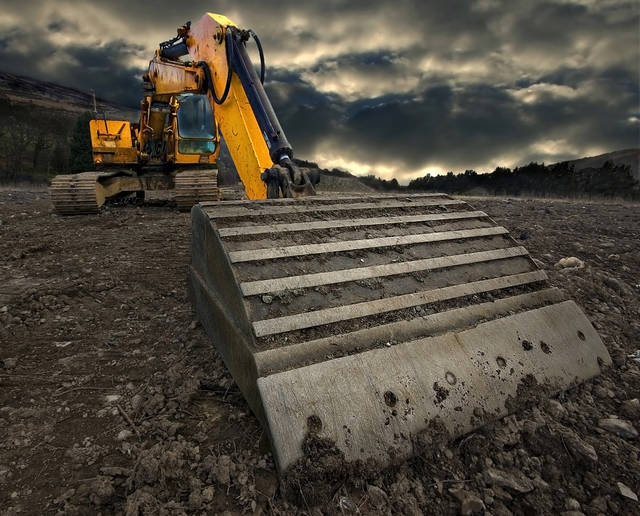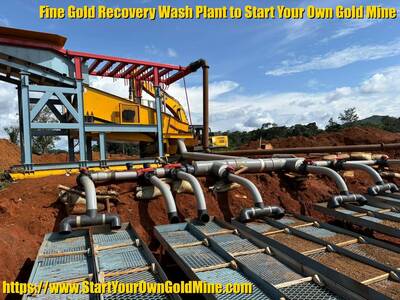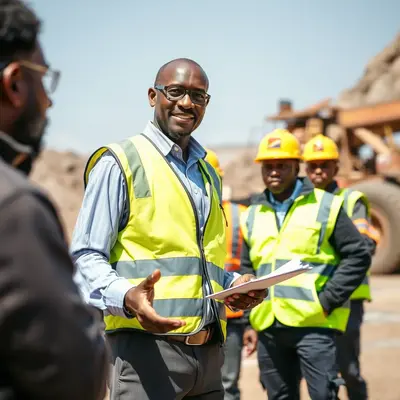THE OPENING OF MINES.
The word “exploitation” is used by many mining men and engineers to signify a plan of so opening up ore deposits as to render the contents removable. The same persons use the word “mining” to mean the operations involved in the actual extraction of the ore exploited. It is sometimes difficult to draw any line between the meanings of these two words for, as handled by different men, with varying shades of intention, they are sometimes synonymous. Thus, if exploiting an underground mine, which carries ore right from the surface, means developing the mine in such a way as to provide for a large, steady production, it is difficult to see why the ore taken out in this process cannot be said to be “mined.”
By “dead work” is usually meant that work of opening up a mine which will put or keep it in a producing condition but which does not supply any remuneration in the shape of ore (or coal). Again, as used by some men, there is little distinction between this work and exploitation. There may, however, be lines reasonably drawn between these three terms, and therefore the following definitions are proposed:
Dead work is such work as is necessary to develop an ore body, but it does not produce any ore. It may be prosecuted for drainage or ventilation purposes or for creating passage-ways for men and products.
Exploitation is also work performed in opening up or developing a property, but it does not contemplate the value of the extracted materials which may, or may not, be of any commercial importance. Indeed, much ore might be extracted during work which was carried on merely to define extents or boundaries of ore bodies. In this last supposition, the original sense of exploration is brought out and this should serve to fix the definition clearly in mind.
Mining may be restricted to mean the methods and work involved in the profitable production of the mine’s ore (or coal). The term would not be used to cover operations of shaft-sinking, tunneling, and the like, unless such work be in the valuable materials. Mining may be said to begin whenever there is produced an output upon which there is some profit. Exploitation may be in valuable ground. If so, we may say that mining is in progress during the exploitation. The driving of levels or drifts in an ore body—or of entries in a bed of coal—produces the valuable products of the mine, and we may, therefore, consider that mining is taking place.
The driving of a crosscut through barren rock to reach an ore body is dead work; but the driving of a drift or level in a vein is either exploitation or mining. Dead work produces no ore. Exploitation may, or may not, produce ore. Mining must produce ore.
Throughout all of the above and the following discussion of this chapter, the reader should bear in mind the point that the word “coal” may be substituted for the word “ore” without altering the substance of the definitions or the conclusions.
Before a mine is opened up, the economist-manager will consider many items. In the first place, care must be exercised in the examination of the title to the property. A mineral property may have passed through the most complicated kind of transfers of fractional interests in the title, just as is true with ordinary real estate. The abstract must be traced back clear to the issuance of patent from the Government, and then on back to the original location. With an undeveloped property (a prospect), this precaution is essential to estop any possible pretensions to ownership, by outside parties, in case the ground subsequently turns out to be exceptionally valuable. It has often been the case that no obstructions from any adverse claimants have been met until owners have, in good faith and at great expense, developed splendid mines. Then suits for possession or partial ownership have been instituted, sometimes with marked success for the plaintiffs. There are persons who make it a special line of business to examine titles to mining property, and it is economy for the average manager to employ such experienced men to attend to these matters.
Topographical considerations will hold a place in the study preceding the opening of a new mine. The nature of the surface of the property and the surrounding country will largely influence in the selection of the proper site for the mine’s mouth. Neglect upon this point has been a common cause of failure in mining operations.
A mine opening must be away from all dangers of snow-slides, rock-slides, cloud-bursts and deluges from overflowing streams or breaking dams. It may make a difference in the mine’s ventilation as to which direction the prevailing winds blow and therefore upon which side of a hill the mouth be opened.
Transportation facilities must be given due thought. If means are not already at hand, one must inquire into the feasibility of constructing some form of carrier; and here, again, will enter the question of the surface’s contour. If a railroad is out of question, possibly an aerial tramway may be constructed. These modern conveyances stop at no obstacles of surface configuration and are dependent only upon the necessity of having the point of delivery lower in altitude than the point of loading at the mine. With some of the modern improvements in these installations, mine products are being transported up-hill as well as down-hill through the application of power. In mining regions, it is generally the case that the mines, themselves, are above the settlements in which are the railroads or treatment plants, so that the mine products will transport readily by the natural force of gravity.
Climate holds an important place in the economics of mining. The working of very rich pieces of ground may prove a losing proposition in some portions of the world where the climatic conditions are such as to render operations possible during only a very small portion of the year. Extremes of heat or cold, malaria or other pestilential obstacles, long rainy seasons with floods, and the hostility of native humans, beasts or insects have accounted for the abandonment of seemingly attractive mining projects.
The question of labor must be given due thought. It is true that the best miners on earth are Americans. We do not deny that many of our miners are of foreign birth, but the fact remains that they perform better and more intelligent service than do their fellow countrymen who have not been adopted into our country. Our men are in demand in the mining development of foreign countries. An American mine manager will always experience dissatisfaction while endeavoring to get, from natives in foreign parts, the same efficiency that he is accustomed to receive from the miners “at home.” He may be paying a good deal less per capita for such labor, but he finds he is actually paying more per ton of output.
Even within a single country, there are notable differences in the worth of labor. The natives of some of the Mexican states are far preferable to those of other states. Within the United States, there may be discerned material differences between the efficiencies of the citizens of various sections, when it comes to mining. One cannot procure as competent miners in some of the agricultural states as in the typical mining states. This is but to be expected. For instance, there are deposits of lead ore in the “moonshine” regions of Kentucky which have never been successfully worked, and the real cause of failure, in the writer’s belief, lies in the inability of superintendents to obtain real miners either in that region or from the outside. The residents will never become miners; outsiders will not enter for work under existing sociological conditions.
The question of unionism is sometimes held by managers as a deciding one when debating the opening of a mine. While there are those who will broadly denounce such organizations, there may be found other and just as successful mine operators who declare that the effects of union control over their miners are beneficial to their companies' interests. Probably the greatest objection to unionism raised by operators is that they resent the dictation that accompanies the inauguration of union rules in their mines. The owners and managers prefer to run their own business to suit themselves. Some managers are so imbued with this conviction of their own rights that they will refuse to open up mines or, if they are operating, they will close down their mines before they will submit to the demands made upon them by the union officials.
On the other hand, there are mine managers who prefer the presence of some central, labor-controlling body; for they believe that the men who belong to such a large federation or organization will, and do, have less complaint to make and therefore work more freely than is the case with the independent laborers. The argument is that these union men are satisfied because they feel that their interests are being looked after with a sort of attention that they, individually, could not give.
This is not a place to discuss the crimes that have been laid at the doors of both the labor organizations and the mine owners' associations. It is safe to assume that wrong has probably been done by both sides. But it is furthermore right to believe that most of the crimes were not authorized, nor recognized, by the officers or the majority of members of either side. Individual members must not be taken as averages of the membership in any kind of civil, social or political organization.
It seems entirely wrong that politics should enter into the considerations of a mine manager whose operations are apparently so apart from affairs of state; but the fact remains that there are places where mining operations cannot be carried on without the good will of certain officials of the state or national governments. It is not advisable to enter into any compromising terms to gain privileges for carrying on any legitimate business for there are other, better ways, generally, of attaining the justice that is deserved.
One must not omit to investigate the sources of supply for all the needs of a mine and its camp. There are many kinds of materials needed to keep a mine going. Fuel, machinery, timber, water, food for men and beasts, lumber, and all household furnishings and necessities must come from some markets or natural sources. It behooves the cautious manager to see that all these things may be had in ample amount and at figures which will not prove annihilating to his business.
In Utah, there are mines which have all their timbers framed in and shipped from the forests of Oregon, the sawing and framing being done before shipment to save on freight. The fir of Oregon is shipped to distant Australia for mining purposes. The arid camps of Nevada get their supplies of timber from the sister state, California. The Michigan mines are fortunate in being in a lumber region. Colorado’s metal mines are more favored in the matter of timbers than are the coal mines of the same state. Most of the coal mines are upon the barren plains, while the metal mines are chiefly in the wooded mountains.
Water may be too scarce for the needs of a mine or its community. There may not be sufficient to supply boilers or a mill, or for the domestic purposes of the workers. On the other hand, water may be so abundant in the mine workings as to prove a deterrent factor in profitable operation. With shaft mines, having deep workings and low grades of ore, if water must be delivered mechanically, the costs for such drainage are frequently prohibitive of mining. Some mines, in arid regions, have been fortunate in striking such flows of underground water that it has been possible to operate mills right at the mines. In this way, the cost of water hoisting has been more than compensated in the milling benefits which, in turn, have decreased freights and treatment charges.
Machinery is usually purchased at centres of mining supplies and manufactures. San Francisco, Los Angeles, Salt Lake City, Denver and Chicago are the principal rendezvous in the West for mining men in need of machinery. Mexico City is, similarly, the outfitting point for the mines of southern Mexico. The United States holds the supremacy of the world in the matter of equipping mines and mills, large orders of American-made mining machinery being shipped to even the antipodes.
The nearer a property is to a depot of supplies, the less is bound to be the cost of getting goods onto the ground. It is this last item—the delivery of goods—that must be recognized as a very pertinent, and sometimes a critical, factor upon the cost side of mining accounts. Mines that are remote or in rugged countries are frequently dependent upon animal transportation. In some cases, machinery going to the mines must be so built that it may be taken apart into small portions suitable for loading upon the backs of horses or burros, or even, in the Andes, upon the frail llamas.
Operations, if planned to be conducted for a long term of years and therefore warranting the installation of large and expensive plants, should be based upon the holding of extensive ore-bearing ground. Here enters the notion of the shape and size of a mining property.
With some kinds of mining ground, the best form for the holdings would probably be a compact, approximately equilateral tract, covering a reasonably large acreage. This would be the case with ores that occur in sedimentary beds, for instance, where it is advisable to have the mining plant centrally located so as to work expeditiously the entire area. This would apply to a region like the Cripple Creek District, which contains innumerable veins running in all directions but displaying no outcrops.
In other instances, the most desirable shape might be long, narrow strips so laid off as to contain the strikes of persistent lodes or veins, as those of the wonderful Comstock Lode region. It is not acreage that counts here so much as lineal extent.
In the Transvaal, land is held in rectangular blocks. The first owners of the ground took it up for agricultural purposes. This same statement is also true of the mining properties in the Joplin District of Missouri and Kansas.
In the case of the South African properties, every company has definite boundaries to which operations may be planned. Hence it is possible for the management to so plant any mine as to operate it at a given rate for a predetermined life of the enterprise. The work is planned to maintain a certain output that will exhaust the ore bodies in just so many years, and all the equipment may thus be purchased with the forecast that it will serve its purpose and perform its economic share within the prescribed time.
This notion will be more readily understood when we consider the various types of ore bodies. With properties wherein there is no possible way of predicting the number, size, and worth of discoverable ore bodies, the life is wholly problematical and it is therefore difficult for a manager to decide how much he should expend in the initial equipment.


